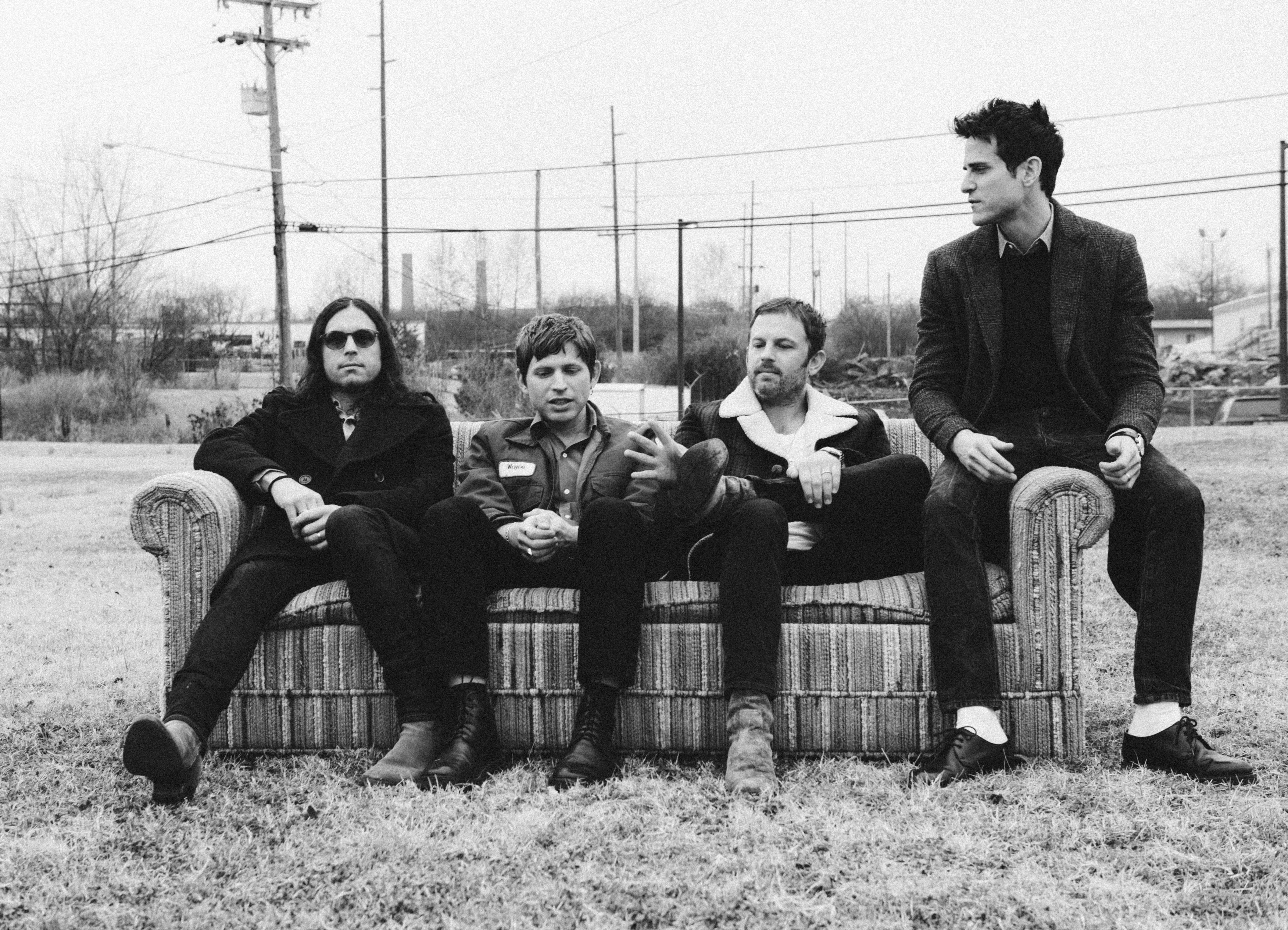Kings of Leon think NFTs are the future of the music industry, but WTF is an NFT?
The Nashville rockers are selling their new album via a digital token... but what’s so revolutionary about that? Quite a lot, finds Will Pritchard

Last week, the already world-famous rock band Kings of Leon grabbed a few extra headlines for the release of their new album by announcing that it would be available as an NFT. This, the group claimed, marked a music industry first – and an exciting new era for musicians and their fans. An NFT is a unique “non-fungible token” that acts like a digital certificate of authentication, and can be used to prove ownership of a specific piece of music, art, or merch, or secure access to live shows. It differs from a normal digital ticket or download file in that it can’t be copied. NFTs have been compared to digital currencies like Bitcoin or Ether, but they differ in a few key ways – which we’ll get into in more detail later.
Of course, artists employing gimmicks to shift albums is nothing new. But occasionally the attention these gimmicks garner helps drive the momentum required for bigger changes.
U2 were among the first top tier acts to back Apple’s iTunes Music Store in the early Noughties – a relationship that precipitated TV ads, a limited edition black and red iPod, and, in 2014, one of the worst album rollouts of all time when the band’s new album, Songs of Innocence, was forced onto the accounts of half a billion iTunes users worldwide. The backlash this stunt generated was enough to force the tech giant to publish instructions on how to delete the album. But the anger had also confirmed that people cared about their digital music collections in the same way that they cherished the CDs, cassettes, and LPs on their shelves. This was a turning point. Similarly, Radiohead’s “pay-what-you-want” approach for the digital release of In Rainbows in 2007 had got industry tongues wagging – drawing praise from the press, but ire from fellow artists including Kim Gordon, Lily Allen, and Trent Reznor. Uptake of this honesty box method has since rippled out beyond the realm of world-famous rock bands, and remains a popular (and apparently lucrative) option on direct-to-fan online stores like Bandcamp.
Where U2 and Radiohead aimed to put their music in as many people’s hands as possible, rarity is more often employed as an easy way to increase value. Limited-edition releases are commonplace, and industry initiatives like Record Store Day thrive off them. But the ease with which digital files can be shared and duplicated dismantles the concept of exclusive ownership. The early-Noughties boom in digital music piracy just about brought the industry to its knees. The subsequent invention of streaming – and the ability to carry the history of recorded music around in your pocket for just a tenner a month – has made the distinction between scarcity and ubiquity sharper. Albums that aren’t available on streaming services today are considered even rarer as a result, but these examples are increasingly few and far between. Since the dawn of the digital era, many artists and their managers have sought new ways to inject value into their recordings.
NFTs, some say, are the answer.
The technology has already caused a stir in the art world, with Extremely Online musicians and influencers like Grimes and Logan Paul selling GIFs and memes for millions of dollars in cryptocurrency. These kinds of transaction have become more common in the gaming world over the past few years. CryptoKitties, a game that lets players trade digital cats for crypto coins, is the most commonly proffered early example. More recently, gamers have auctioned virtual race tracks (access to which can then be rented to other players). It’s taken the music industry a little longer to catch up.

The inflated auction prices of recent weeks are a symptom of the hype surrounding this new type of exchange, but also a result of the fact that early adopters of cryptocurrencies like Bitcoin and Ether have seen huge returns on often meagre initial investments. A single Bitcoin purchased for a dollar in April 2011 would be worth nearly $40,000 (£29,000) today. If you’d splashed out and exchanged $50, you’d be on your way to multimillionaire status. A few thousand dollars’ worth starts looking like pocket change – so why not take a punt on a cat GIF?
At this point, it’s worth explaining what an NFT is in a bit more depth. The name “non-fungible token” borrows from economics: something that’s non-fungible has unique properties that cannot be copied or interchanged for other items. A fungible item, on the other hand, can be replicated and exchanged for goods or services equivalent to its value. Coins are fungible. Picasso’s Weeping Woman is non-fungible. You can trade a pound coin for another pound coin or a bag of crisps, just as you can swap it for a dollar-and-a-bit, depending on the exchange rate. Most corner shops wouldn’t accept a painting for a bag of crisps.
Cryptocurrencies represent the digital version of fungible tokens, NFTs are the digital equivalent of, well, non-fungible tokens. When applied to digital art (be that a piece of music or something visual), the NFT serves as a certificate of ownership and authentication of that piece of art’s unique properties. What you get, via a long, complicated, and expensive process, is a token that gives you access to the music and any of the extras you’ve chosen to pay for. This might seem odd until you consider that fans also spend hundreds of dollars on deluxe edition boxsets of albums they already own.
NFTs are created on blockchains. A blockchain is a type of public database that exists across multiple computers in a network. Information in the database is stored and shared across all of the computers in the network. Transactions that occur within the network are visible to everyone, and can’t be undone without dismantling the entire network. It’s like breaking eggs into a cake mix: once the eggs are in the batter, they’re an integral part of the pudding and can’t be taken back out. Proponents of the technology include Tim Berners-Lee, the inventor of the World Wide Web, who has in recent years poured his energies into decentralising the web in an attempt to return it to something closer to his original utopian vision. Writing in 2018, he said: “I’ve always believed the web is for everyone. That’s why I and others fight fiercely to protect it. The changes we’ve managed to bring have created a better and more connected world. But for all the good we’ve achieved, the web has evolved into an engine of inequity and division; swayed by powerful forces who use it for their own agendas.”
Enjoy unlimited access to 100 million ad-free songs and podcasts with Amazon Music
Sign up now for a 30-day free trial. Terms apply.
ADVERTISEMENT. If you sign up to this service we will earn commission. This revenue helps to fund journalism across The Independent.
Enjoy unlimited access to 100 million ad-free songs and podcasts with Amazon Music
Sign up now for a 30-day free trial. Terms apply.
ADVERTISEMENT. If you sign up to this service we will earn commission. This revenue helps to fund journalism across The Independent.
The specific relevance of all this to the music industry is contested.
NFT enthusiasts argue that, as more and more of the world shifts online, there’s a need to develop digital equivalents for the properties of physical items – things like “scarcity, uniqueness, and proof of ownership”. Some wonder whether a society defined by the pursuit of ownership is necessarily all it’s cracked up to be. While others see this type of society as an inevitability, and work instead to have their say in the rules or values that will shape its future.
The NFTs sold by Kings of Leon looked a lot like a typical merch bundle: offering limited-edition vinyl, access to future live shows, or alternative album artwork. Josh Katz, the CEO of YellowHeart, the company that developed the band’s tokens, told Rolling Stone that “in the future, I think this will be how people release their tracks: When they sell 100,000 [NFTs] at a dollar each, then they just made $100,000.” Which doesn’t sound all that different from paying to download a song on iTunes. So far, so familiar.
However, those backing NFTs are largely doing so because of the other capabilities they (and the blockchains they exist on) offer. NFTs are powered by smart contracts. This means the token’s creator can include a set of rules to govern what should happen as and when the NFT is used or changes hands, and it’s this functionality that’s had people in the industry most excited about the tech’s possibilities. The company behind Kings of Leon’s offering, for instance, was originally started with the aim of replacing gig tickets with NFTs – using the smart contracts to prevent touts from scalping genuine fans.
A gig ticket minted with an NFT is impossible to duplicate, and its ownership is ascribed to the person who purchased it. The ability to embed smart contracts in the “NFTickets” would mean event organisers can control how resales, exchanges, and returns are managed – as well as how the income from each transaction is split out between, for instance, the venue, promoter, and acts booked to play the show. The same logic can be applied to streaming and downloads, with the original creators (the musicians) able to retain direct ownership of their rights and have smart contracts trigger royalties for sales or plays – with the money heading straight back to them, no middleman required.
It’s easy to write off the current wave of hype as just that: hype. But it’s undeniable that one of the biggest rock bands in the world jumping on the NFT train will give it a momentum boost one way or the other. The Kings of Leon auction was extended, at least in part, because fans were apparently struggling to work out how to purchase the tokens (a statement from the band posted to the auction site said “Many fans are first-time NFT buyers and are experiencing a learning curve. WE HEAR YOU.”) Fair enough: none of this is even remotely easy to understand. But attaching the technology to something familiar, like a deluxe album bundle, is a way of introducing fans to this new way of interacting with artists and their music. U2’s deal with Apple has been viewed as a turning point because it signalled the moment at which the music and tech industries became irreversibly intertwined. YellowHeart, initially set up to pioneer the use of blockchain in the ticketing sector (which has been, to put it lightly, quiet of late), will have been able to use this stunt as a dose of blockchain-evangelism to further the cause. Needless to say, the topic of NFTs hasn’t appeared in any of the many interviews Kings of Leon have given around their album release.
Some uncomfortable questions remain. Is something like the authenticity-and-ownership-obsessed art market – characterised by some onlookers as a huge money launderette – really worth replicating? Is the way to restore value to music simply to financialise it? Marc Hogan, writing for music website Pitchfork, puts it most pithily: “there’s a reason that great art is often called priceless.” It’s hard not to be cynical when the same investors that have pumped their cash into keeping profitless streaming platforms afloat at the expense of artist incomes are training their wallets on the crypto space – especially when they have an outsize advantage by nature not just of their mountains of money, but their access to technical expertise too. The blockchain technology that props up NFTs has been hailed for the utopian ideals it was founded on. But is it fair that access to a future utopia should require such high levels of technical acumen (and piles of crypto cash)? It’s entirely possible that the middlemen NFTs remove will simply be replaced with new ones, that look uncannily like their predecessors.
In many ways, this debate is about more than just music – or memes or GIFs or virtual race tracks – and really about the future of the internet itself. If Tim Berners-Lee is to be believed (and he’s got some pedigree to lean on here), we’ve approached a crucial point at which we get to decide what the future of the internet looks like. Will this future simply replicate the same unequal structures that exist today, or could blockchains, NFTs, and cryptocurrencies offer a remedy? Who gets a seat at the negotiating table – and what the soundtrack will be – will decide that. Can music, like the web, be for everyone too?
Join our commenting forum
Join thought-provoking conversations, follow other Independent readers and see their replies
Comments



Bookmark popover
Removed from bookmarks